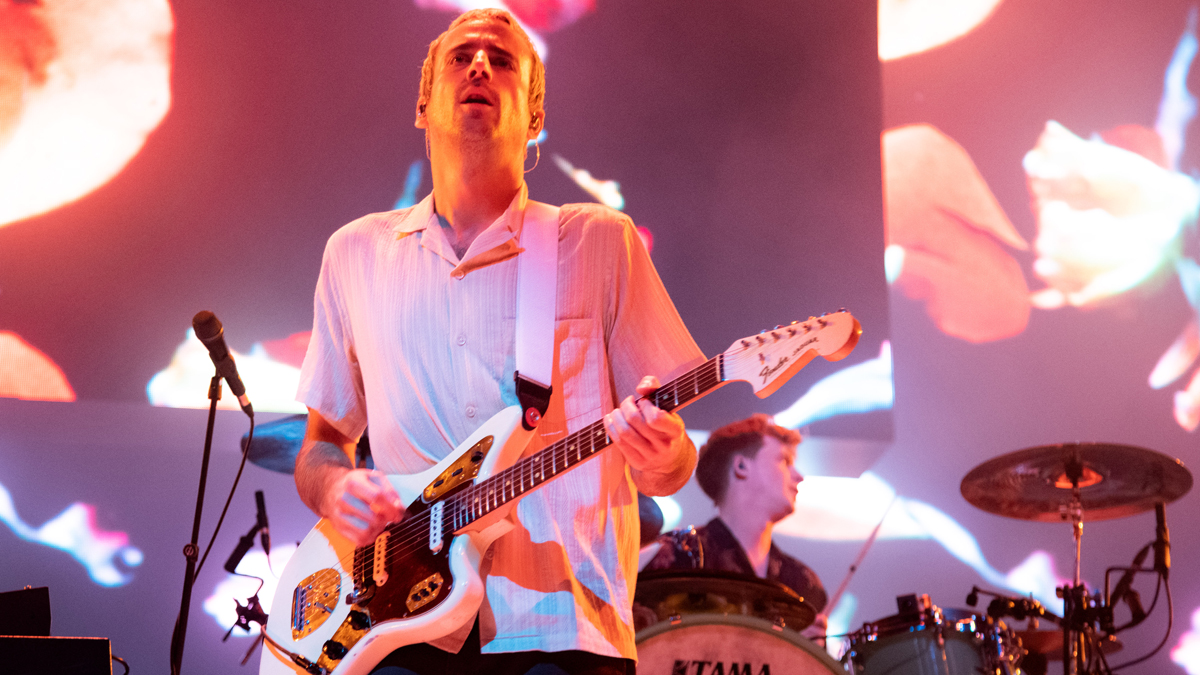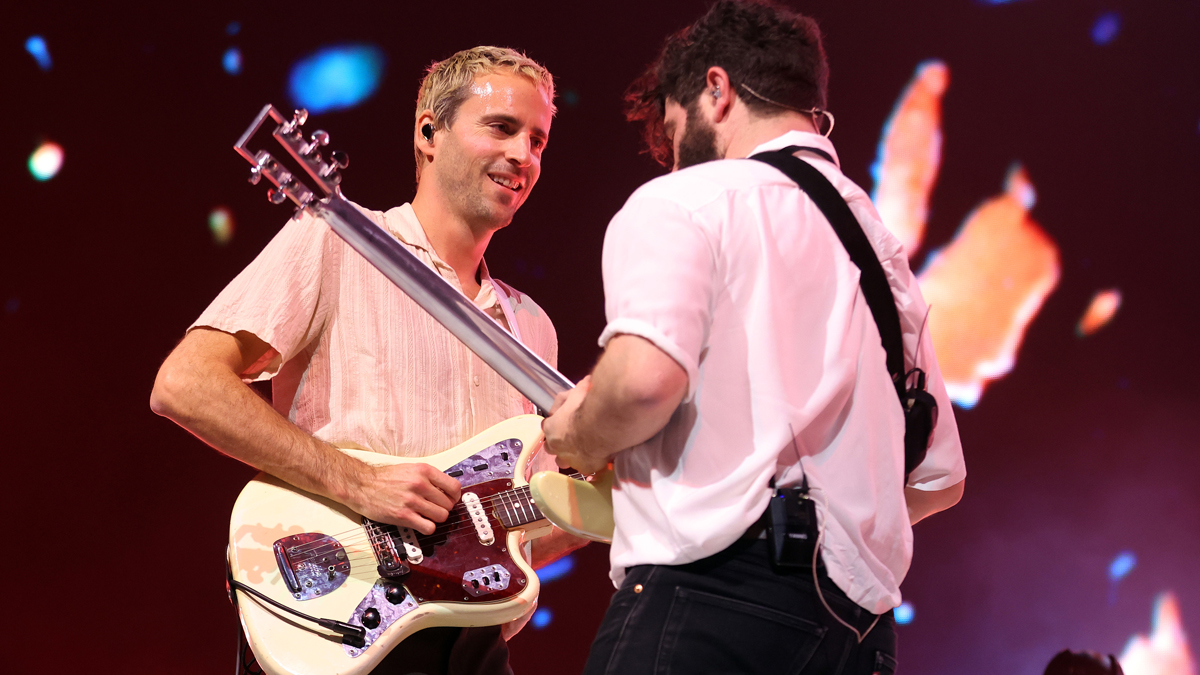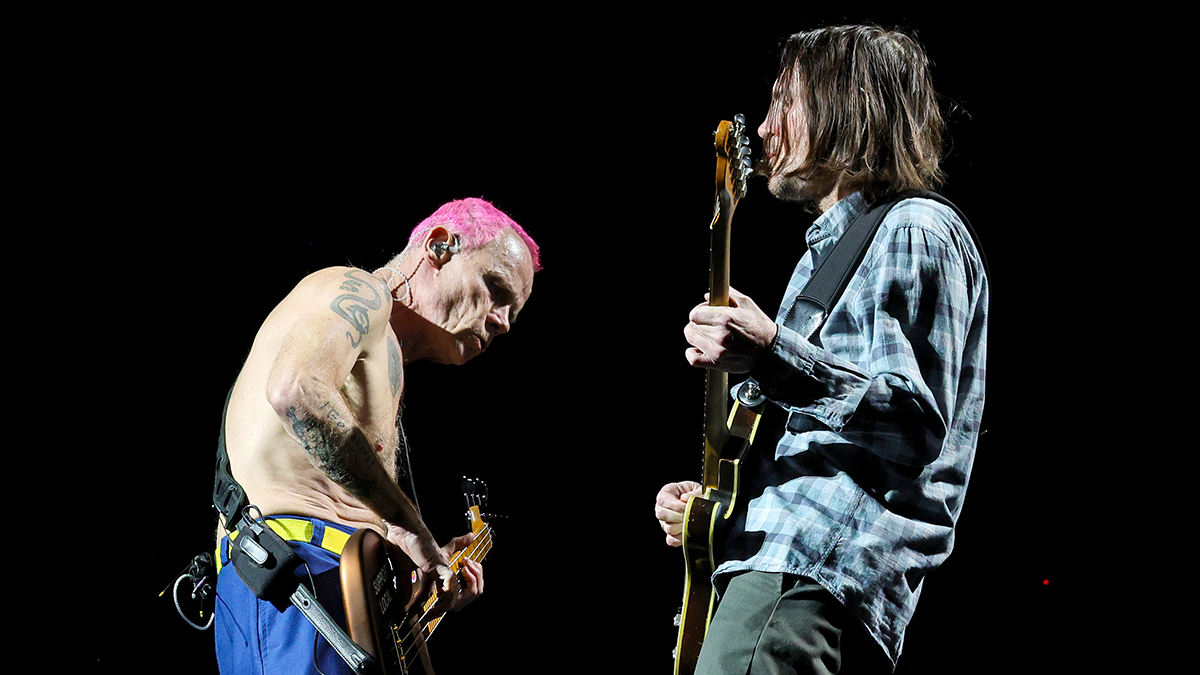Foals' Jimmy Smith talks overcoming nerves to develop his "naïve" style – and why ditching pedals helped him embrace a positive guitar attitude
The Jaguar-toting disco-math-rocker dissects his approach to making dance music with guitars

All the latest guitar news, interviews, lessons, reviews, deals and more, direct to your inbox!
You are now subscribed
Your newsletter sign-up was successful
When Foals first began, the Oxford, England-born band likely had no idea how their music would evolve over the next two decades. Today, they're known for their intricate sounds over bright, danceable music, making them a beloved name since their inception in 2005.
But over the years, the band have been forced to evolve, losing one of their original singers and shaping and reshaping themselves, maneuvering between math rock, traditional rock and even funk and disco.
Now, the band are releasing their latest LP, Life Is Yours, and with it comes a fresh sound, but one that continues to encompass many earlier elements. But on this new album, the band – particularly guitarist Jimmy Smith – sought to find cleaner, less “distracted” tones and aesthetics. Gone were mountains of pedals and in their place are a clearer sense of melody and instrumentation.
We caught up with Smith to ask him about his journey with his six-string, how he approached the group’s new album and how his own playing has evolved over the years.
When did you first find the guitar, what made you want to pick it up and play?
“Well, the first guitar I found, other than my mom’s classical, which is what I grew up playing, was a Mexican Stratocaster. And I got it from Denmark Street in London – it used to be like Tin Pan Alley in the UK, where they wrote all those songs. It was where all the music shops were. Sadly now, like a lot of other places, it has been gutted by gentrification. Now it’s just full of restaurants and there’s, like, two guitar shops left. But it used to be all guitars.
“I was like, 'I have to buy a guitar from that street, and I have to buy it from this shop.' I just saw it. It was a Wine Red Mexican Strat with a humbucker on the back. It was great. I still got it. I painted it blue years ago.”
All the latest guitar news, interviews, lessons, reviews, deals and more, direct to your inbox!
What was it like for you in the early days of Foals? How did you approach the band, guitar-wise? How did you blend your playing style with the goals of the group?
We were basically trying to transcribe minimal techno onto guitars… we wanted to make clinical dance music with guitars
“I joined in 2005, right at the beginning of Foals. But there was also another singer then, Andrew Mears, who also played guitar and who also is a phenomenal guitar player. And between him and Yannis [Philippakis], our only singer [now], he’s probably the best guitarist I’ve ever seen, or one of them. I remember listening through the door and it was like, 'Oh, good lord! What am I going to do?'
“So, I just sort of filled in the bits that they didn’t do. I kept being told to turn my amp up. I had my amp really quiet a lot of the time! And then once Andrew left, obviously there was a lot more room to figure out what I was doing. That’s when the Foals that we all know came alive, basically. And we were obviously interested in odd time signatures. And the genre, of whether you want to call it that or not, of math rock.
“There were some bands from mainly Chicago, actually – like this band Sweep the Leg Johnny that was a big influence. But other than that, we were basically trying to transcribe minimal techno onto guitars. Or the idea of having loads of polyrhythms and then taking bits out. But you can still almost hear the missing notes. That was the very beginning of it. We kind of wanted to make clinical dance music with guitars.”
You mentioned keeping your amp’s volume down. Why do you think you were initially shy, and what broke you out of that mentality?
“I’m a shy person. I always say I don’t think I really should be doing this [laughs]. I sort of have to go through hell every time I go on stage! But actually, well it was Andrew. The first year I was in Foals, like I said, it was a different version of the band. And Andrew recognized that I was struggling with confidence and stuff. It really was a brave new world for me. I’d never experienced anything like it. You know, I’m a little bit of a country bumpkin.
“He made a point about always putting me at the front of the stage. Making sure the stage lights were on me. Making sure I turned my amp up. He kept doing it. Relentlessly. And now I can sit down and say, 'Man, thank you so much. I really credit you with getting over my crippling stage fright.' And now I can manage it when it comes along.”
How did you initially approach the writing and recording of the new Foals album from a guitar point of view?
For the albums before, we were venturing into quite heavy sounds in some places. [This time] it was all about the guitar line itself and the melody and the tune
“The very beginning of it was me and Yannis – I was actually over in California because my girlfriend lives there. I got locked down, all that sort of stuff. So, I did a lot of writing in the first half of 2020 and so did Yannis. Then I came back over here [to the UK] and we got back into our tiny rehearsal space, which we’ve got in this place called Peckham in South London, where we all live. And it’s the classic rehearsal room: it’s just got grey carpet, grey walls. And nothing else. [Laughs] Not even a picture on the wall!
“And we just got in there and we had a couple of things already going and we just started writing. My approach to guitar this time was no effects pedals and just straight into the amp. Like it used to be. Before I could even afford a tuner pedal. And it was great. I loved it. I just had a Fender Twin and my 1965 Jaguar and it was so sick. I think the idea of that was to sort of get away from any distractions from pedals.
“Because for the albums before, we were venturing into quite heavy sounds in some places. And that was largely due to the existence of the fuzz pedal, really. You know, if you stand there looking at it long enough, you’re going to push it on! So [the idea] was sort of to get rid of anything within eyesight so there were no distractions. It was all about the guitar line itself and the melody and the tune.”

The album features some rock sounds, like on the song Flutter. But more than that, there’s lots of fast-paced, funky, even disco sensibilities. What did you enjoy about the combination of all these sounds on the new record?
“Well, I find it kind of surprising sometimes the things that come out of us. Because we never really set off for any specific genre. It’s something about the combo of me and Yannis on the guitar where we just start – we’ll play some disco lines and stuff. And go, 'Oh my god, that sounds a bit like that. Wow, cool!' It just feels like you’ve come up with it again, you know?
“You’re sort of inventing it again, which sounds a bit pretentious, but I mean that in a very naïve way. But obviously the landscape outside of the studio when we were writing this record was obviously, like, coronavirus. So, it was pretty bleak as everybody knows and remembers. I experienced coronavirus in California and I experienced coronavirus in London. And coronavirus in London is a lot bleaker! Just because of the weather.
“So, yeah, we were just generating these positive sounds, basically. Because we were kind of escaping ourselves, through the music. So, those late night upbeat warm disco palates with some of the original techno guitars coming back in, like you said, occasionally a slightly more rock-orientated fuzz guitar. But it was all positive warm sounds. There’s not really any nastiness on this record.”
What gear did you use on the new album? I know the band has used Travis Beans in the past.
“For starters, the Travis Bean is Yannis’s guitar. He’s got a few of them now. He’s always played it and it’s an unbeatable combo for the clean sound, which we love. The short, bright, snappy sound. But with some weight to it. His combo of a Travis Bean and a Hiwatt head and cab is just unbeatable! And sometimes in the studio, he’s got an old Selmer amp, which sounds really good.
“I pretty much did everything on a 1965 L Series Jag. And a Fender Twin. But I also had a Gibson Les Paul Custom 1971, which is amazing. I was using Princetons a lot for recording. For the actual recording, I found the Fender Twins to be a little bit too brittle. So the Princetons were great in the studio. And that was about it, amp-wise.
“When we made the 4th record [2015's What Went Down], I remember we set up an entire circle of amps with mics on, and it was every single type of amp. And we’d just re-amp all the guitars through each amp until we found the one that fit the song the best. But I think it was just a little simpler this time. And pedals-wise, I can’t really remember.
“I’m trying to think if any specific pedal was essential. I mean, there’s this pedal, the Microcosm pedal, by Hologram – I would say that was pretty, pretty great. But that was more used on synthesizers, thinking about it.”
Was there any trial and error in the studio when choosing sounds or equipment? Any suggestions from the producers of the album that affected the guitar sounds?
“You know, the downside of smoking a lot of weed during the recording is that it’s a little foggy! [laughs] I feel, personally speaking, I played quite a lot of synthesizer on this record, as well. So, the main experimentation was on that side with the producers. Because they seemed more experienced. We’d have picked up a guitar sound from recording in the room for demos of these songs with some of these producers. We even used some of those lines.
“Actually, I will say we worked with producer Dan Carey, and we recorded in his studio under his house in South London. And his setup is kind of crazy. I didn’t use any of my amps. I literally just walked in with my guitar and just plugged in to whatever he had. I honestly couldn’t tell you what amp it was because I’d never seen it before. It was incredibly unique – and all his gear is like that. It’s all unique. And it’s all wired in.
“So, sound was coming out of everywhere, and he was sending our guitars in through his modular stuff and then back out through the amps! And he had a sidechaining reverb on a lot of stuff. Recording with him, the slightly wilder guitar sounds were just recorded direct. And that was it: they were done. There was no tweaking after.”
And now how are you thinking about the future in terms of your own journey with the guitar?
I would love someone to show me some tricks. Someone only needs to show me one new chord, and that would just open up the door and that will be me for the next five years
“That’s a good question, certainly for me. Because, how long have I been playing guitar? Like, 30 years or something. And I’m frustratingly bad at it in certain areas because I’m self-taught. I feel like I have this thing, every time I pick up a guitar, it takes me about a minute to get used to it again, even though it’s something I do every day! [Laughs] So, I would like to in some way learn some more stuff without jeopardizing my style. Because it is a sort of naïve way of playing the guitar. I don’t want to lose that.
“But I would love someone to show me some tricks. Someone only needs to show me one new chord, and that would just open up the door and that will be me for the next five years. I can branch off from that. I need a little more stimulation!
“And certainly with the guitars themselves, I’ve got this pair of '60s Jaguars now and I think I just want to stick with them for a decade or so – they’re so nice and I just want to wear them down even more and get to know every single sound they can make. That’s where I’m at the moment. I want to really go deeper into the actual guitar itself and not distract myself with amplifiers or pedals. Certainly pedals can be a big distraction, I find. It’s a great distraction, though!”
What do you love most about the guitar and the way you play it?
“It fascinates me. I can pick it up and I can do something new on it every day. And it’s not just me doing that; it’s millions of people. The guitar’s been around so long now, the electric guitar, as well. It’s just so amazing that you can still do so much stuff with it. It just blows my mind.
“I love doing a bit of an Elvis at the moment and just sitting on the sofa, watching TV and just playing guitar! I think maybe that’s a lockdown thing for me, and I really like it. I’m just really enjoying playing a lot of simple guitar at the moment. There’s a romance to it that I love.”
- Life Is Yours is out now via Warner/ADA.
